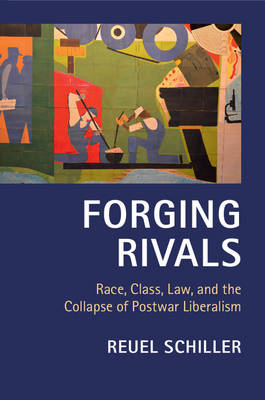
Forging Rivals
Race, Class, Law, and the Collapse of Postwar Liberalism
Seiten
2015
Cambridge University Press (Verlag)
978-1-107-01226-4 (ISBN)
Cambridge University Press (Verlag)
978-1-107-01226-4 (ISBN)
Forging Rivals tells the story of the rise and fall of postwar liberalism, vividly recounting the attempts of working people, labor lawyers, and civil rights litigators to create a legal system that promoted both economic opportunity and racial egalitarianism.
The three decades after the end of World War II saw the rise and fall of a particular version of liberalism in which the state committed itself to promoting a modest form of economic egalitarianism while simultaneously embracing ethnic, racial, and religious pluralism. But by the mid-1970s, postwar liberalism was in a shambles: while its commitment to pluralism remained, its economic policies had been abandoned, and the Democratic Party, its primary political vehicle, was collapsing. Schiller attributes this demise to the legal architecture of postwar liberalism, arguing that postwar liberalism's goals of advancing economic egalitarianism and promoting pluralism ultimately conflicted with each other. Through the use of specific historical examples, Schiller demonstrates that postwar liberalism was riddled with legal and institutional contradictions that undermined progressive politics in the mid-twentieth-century United States.
The three decades after the end of World War II saw the rise and fall of a particular version of liberalism in which the state committed itself to promoting a modest form of economic egalitarianism while simultaneously embracing ethnic, racial, and religious pluralism. But by the mid-1970s, postwar liberalism was in a shambles: while its commitment to pluralism remained, its economic policies had been abandoned, and the Democratic Party, its primary political vehicle, was collapsing. Schiller attributes this demise to the legal architecture of postwar liberalism, arguing that postwar liberalism's goals of advancing economic egalitarianism and promoting pluralism ultimately conflicted with each other. Through the use of specific historical examples, Schiller demonstrates that postwar liberalism was riddled with legal and institutional contradictions that undermined progressive politics in the mid-twentieth-century United States.
Reuel Schiller is a Professor of Law at the University of California, Hastings College of Law, where he teaches American legal history, labor law, and administrative law.
Introduction. Legal history and the death of postwar liberalism; 1. Forging postwar liberalism; 2. Ed Rainbow's problem; 3. The phony commission; 4. A tale of two propositions; 5. 1966: a terrible year for George Johns; 6. 'The day of the minstrel show is over'; 7. Forging rivals, shattering liberalism.
| Erscheint lt. Verlag | 23.3.2015 |
|---|---|
| Reihe/Serie | Cambridge Historical Studies in American Law and Society |
| Zusatzinfo | 9 Halftones, unspecified |
| Verlagsort | Cambridge |
| Sprache | englisch |
| Maße | 158 x 235 mm |
| Gewicht | 610 g |
| Themenwelt | Geschichte ► Allgemeine Geschichte ► Neuzeit (bis 1918) |
| Geschichte ► Allgemeine Geschichte ► Zeitgeschichte | |
| Geisteswissenschaften ► Geschichte ► Regional- / Ländergeschichte | |
| Geschichte ► Teilgebiete der Geschichte ► Kulturgeschichte | |
| Geschichte ► Teilgebiete der Geschichte ► Militärgeschichte | |
| Geschichte ► Teilgebiete der Geschichte ► Sozialgeschichte | |
| Recht / Steuern ► EU / Internationales Recht | |
| Recht / Steuern ► Rechtsgeschichte | |
| Sozialwissenschaften ► Politik / Verwaltung ► Politische Systeme | |
| Sozialwissenschaften ► Politik / Verwaltung ► Politische Theorie | |
| ISBN-10 | 1-107-01226-0 / 1107012260 |
| ISBN-13 | 978-1-107-01226-4 / 9781107012264 |
| Zustand | Neuware |
| Haben Sie eine Frage zum Produkt? |
Mehr entdecken
aus dem Bereich
aus dem Bereich
Europa 1848/49 und der Kampf für eine neue Welt
Buch | Hardcover (2023)
DVA (Verlag)
48,00 €
Giordano Bruno - ein ketzerisches Leben
Buch | Hardcover (2024)
C.H.Beck (Verlag)
29,90 €


